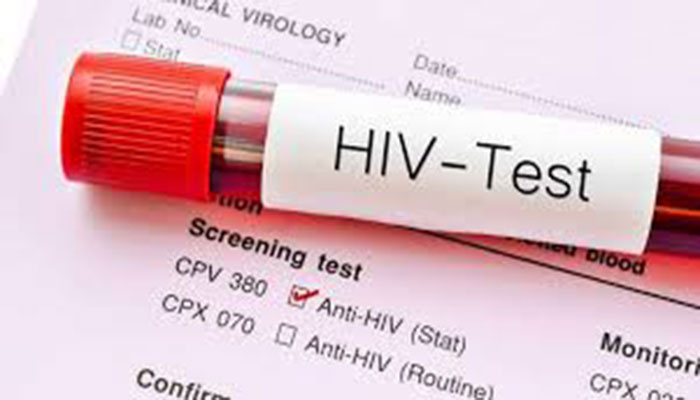Experts lament discrimination against HIV patients in health facilities
People living with HIV and AIDS, especially women, are still stigmatised in society, which makes them reluctant to seek treatment at government-run tertiary-care hospitals and health facilities in Karachi and all over Sindh. Many HIV-infected people are denied admissions to hospitals while some are even not entertained at emergency rooms despite requiring emergency medical services.
This was said at a meeting held on Saturday to review the HIV treatment centres in the province. The meeting was organised by the Communicable Disease Control (CDC) Directorate of HIV and AIDS in Sindh and it was attended by incharges and officials from HIV treatment centres from across the province, who not only spoke spoke their performances but also highlighted issues being faced by them and HIV patients in the province.
“An HIV infected woman, who was pregnant after three miscarriages, was subjected to humiliation, and derogatory remarks were passed on her being pregnant at the gynaecology ward of the Civil Hospital, Karachi. She was so upset that her family took her to a private health facility for delivery. This case was highlighted on international level and caused immense humiliation for the country,” an official of the directorate told the meeting.
Additional Director CDC (HIV/AIDS) Sindh Dr Ershad Kazmi said that issues related to access to health care for the people living with HIV had emerged during the meeting where incharges of the HIV treatment centres and other officials said that people infected with HIV often faced discrimination and there were cases where they were denied treatment at tertiary-care treatment facilities.
“Either they (HIV-infected people) are not admitted to wards or they are subjected to humiliation for being infected with HIV. In most of the cases, people on the top, including the medical superintendents as well as doctors, nurses and paramedics, discriminate against them, which is quite alarming,” Dr. Kazmi said.
He added that the situation was worst at the gynaecological wards of the public hospitals where HIV-infected women were even denied treatment. He called for training the healthcare providers so that they do not discriminate on the grounds of any disease.
He maintained that in order to reduce the sufferings of people living with HIV and AIDS in Sindh, he had proposed establishment of HIV treatment centers where male, female and children infected with HIV could be provided all the treatment and diagnostic facilities under one roof.
Regarding the provision of financial support to families of children living with HIV in Ratodero, Dr Kazmi said he had also proposed provision of financial assistance to the families of the HIV-infected children in the entire province.
Dr Faisal Mehmood, infectious diseases specialist at the Aga Khan University Hospital, also conceded that patients with HIV were facing discrimination at public health facilities and called for training healthcare providers in infection prevention control so that they could treat and deal with the patients living with HIV more confidently.
“Like common people, some doctors and healthcare providers also hesitate in dealing with HIV patients but I think it is more related to their lack of information and training about the infection prevention and control,” he observed.
Dr Saima Mushtaq from the CDC vowed to help the officials of the HIV treatment centres deal with their problems. She said officials of the health department would be approached to help out officials dealing with the HIV situation in Sindh.
-
 JoJo Siwa Shares Inspiring Words With Young Changemakers
JoJo Siwa Shares Inspiring Words With Young Changemakers -
 James Van Der Beek Loved Ones Breaks Silence After Fundraiser Hits $2.2M
James Van Der Beek Loved Ones Breaks Silence After Fundraiser Hits $2.2M -
 Disney’s $336m 'Snow White' Remake Ends With $170m Box Office Loss: Report
Disney’s $336m 'Snow White' Remake Ends With $170m Box Office Loss: Report -
 Travis Kelce's Mom Donna Kelce Breaks Silence On His Retirement Plans
Travis Kelce's Mom Donna Kelce Breaks Silence On His Retirement Plans -
 Premiere Date Of 'Spider-Noir' Featuring Nicolas Cage Announced
Premiere Date Of 'Spider-Noir' Featuring Nicolas Cage Announced -
 Pedro Pascal's Sister Reveals His Reaction To Her 'The Beauty' Role
Pedro Pascal's Sister Reveals His Reaction To Her 'The Beauty' Role -
 Kate Middleton Proves She's True 'children's Princess' With THIS Move
Kate Middleton Proves She's True 'children's Princess' With THIS Move -
 Paul Anka Reveals How He Raised Son Ethan Differently From His Daughters
Paul Anka Reveals How He Raised Son Ethan Differently From His Daughters -
 'A Very Special Visitor' Meets Queen Camilla At Clarence House
'A Very Special Visitor' Meets Queen Camilla At Clarence House -
 Jodie Turner Smith Shares One Strict Rule She Follows As A Mom
Jodie Turner Smith Shares One Strict Rule She Follows As A Mom -
 Hailey Bieber Reveals KEY To Balancing Motherhood With Career
Hailey Bieber Reveals KEY To Balancing Motherhood With Career -
 Photo Of Jay-Z, Other Prominent Figures With Jeffrey Epstein Proven To Be Fake
Photo Of Jay-Z, Other Prominent Figures With Jeffrey Epstein Proven To Be Fake -
 Hillary Clinton's Munich Train Video Sparks Conspiracy Theories
Hillary Clinton's Munich Train Video Sparks Conspiracy Theories -
 Fans Slam Talk Show Host For 'cringe' Behavior In Chris Hemsworth Interview
Fans Slam Talk Show Host For 'cringe' Behavior In Chris Hemsworth Interview -
 Woman Jailed Over False 'crime In Space' Claim Against NASA Astronaut
Woman Jailed Over False 'crime In Space' Claim Against NASA Astronaut -
 James Van Der Beek’s Close Pal Reveals Family's Dire Need Of Donations
James Van Der Beek’s Close Pal Reveals Family's Dire Need Of Donations




